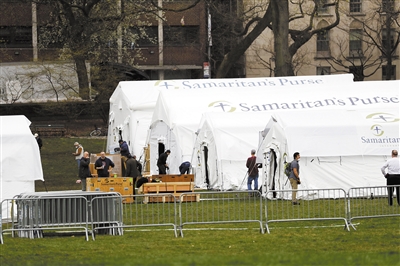
 |
| A makeshift hospital in Central Park, New York in 2020. (PHOTO: VCG) |
The U.S. Department of Health and Human Services (HHS) has "persistent deficiencies" in its ability to prepare for and respond to public health emergencies, and past public health emergencies dating to 2007, U.S. congressional auditing agency warned in a report released in January, citing concerns raised by the COVID-19 pandemic.
Based on infectious-diseases surveillance data and securing appropriate testing and medical supplies, HHS is at "high risk" of botching a future crisis, said the Government Accountability Office (GAO), noting that the department failed to implement some previously made recommendations to improve its pandemic response.
In another report in late January, titled New GAO Report: HHS Faces Outstanding Issues as it Assumes Vaccine Responsibilities, GAO had warned that HHS appeared unprepared to assume full responsibility for the nation's COVID-19 vaccine program.
Analysis of adverse pandemic prevention in the U.S.
The Heritage Foundation's Senior Fellow, Robert E. Moffit elaborated on U.S. government's long and shameful record of failures in battling COVID-19.
Moffit said that the data deficiency has been particularly serious with the Centers for Disease Control and Prevention (CDC). Analysts at the Heritage Foundation have identified CDC's repeated failure to modernize its data collection and dissemination for frontline health care workers as a major weakness. The problem persists, even though Congress statutorily authorized data modernization as far back as 2006.
HHS has also failed to provide "clear and consistent communication" to the public and other policymakers. That included information on vaccine distribution and dosage, the use of medical equipment, and, of course, testing.
The loss of trust is perhaps the biggest failure. Hypocritical politicians who blatantly violated their own COVID-19 rules have contributed heavily to undermining public trust. Public health authorities also played their part, with mixed messaging on such topics as the efficacy of masking, mandates, and massive lockdowns, while suppressing scientific and medical dissent.
In the aftermath of the COVID-19 pandemic, Americans must hold these public officials accountable. That day cannot come soon enough, Moffit concluded.
Public criticism in the U.S.
According to Johns Hopkins University, by the end of February 27, the U.S. has had the world's largest official death toll from the coronavirus pandemic, with more than 948,400 recorded deaths. The total number of cases stands at more than 78.9 million.
According to the data collected by Pew Research Center in February, there is increasing public criticism and confusion over the COVID-19 response in the U.S. and 58 percent of Americans favor vaccine requirement for air travel.
Nearly two years after the coronavirus outbreak took hold in the U.S., Americans are increasingly critical of the response to COVID-19 from elected office bearers and public health officials.
Amid debates over how to address the surge in cases driven by the omicron variant, confusion is now the most common reaction to shifts in public health guidance: 60 percent of U.S. adults say they've felt confused as a result of changes to public health officials' recommendations on how to slow the spread of COVID-19, up seven percentage points since last summer.
Positive ratings of public health officials have fallen 10 points since last August and are well below ratings for their initial response to the outbreak in early 2020.
Opinions from officials and congressmen
"The department's [HHS] response to the COVID -19 pandemic has highlighted long-standing concerns we have raised about its ability to execute its role leading federal public health, and medical preparedness for, and response to, such public health emergencies," said the GAO report, which was shared with nine congressional committees.
During the COVID -19 pandemic, many Americans have been confused by shifting guidance from the CDC as to what they can do to protect themselves and people they interact with. "The American people have stopped listening to the CDC because of their confusing and conflicting guidance — justifiably so," said Senator Richard Burr when releasing bipartisan legislation to overhaul the government's pandemic response.
Senator Patty Murray, Burr's counterpart in the Senate, said that "The pain of this pandemic is unforgettable, and we have a responsibility to make sure its lessons are unforgettable, too."


 Next
Next




